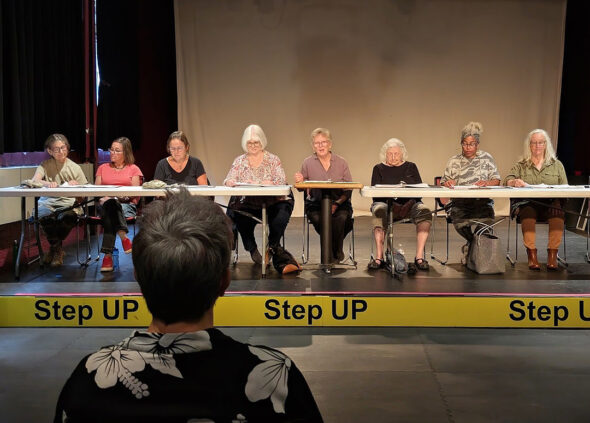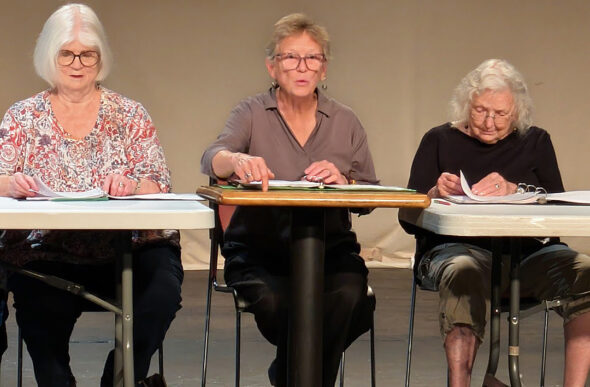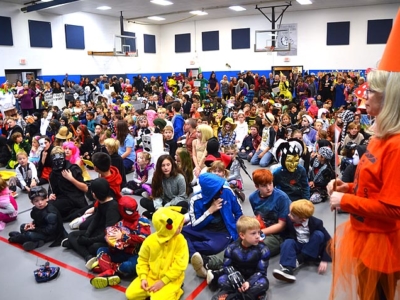
The cast of “We Were There,” from left: Jane Blakelock, Margaret Silliman, Desirée Nickell, Mary Frost-Pierson, Louise Smith, Dinah Anderson, Locksley Harper and Laura Lucas; from behind, director and cast member Amy Bennett. Not pictured: cast member Flo Lorenz. (Photo by Lauren "Chuck" Shows)
Hear the voices of women Vietnam vets in ‘We Were There’
- Published: October 27, 2025
When the women in the cast of “We Were There” gather on stage in the Foundry Theater’s small experimental space, there’s little spectacle — they’re seated in a line at a long table, and they hold their scripts. But when the actors begin to speak, the room fills with the unquiet echo of war, the weight of memory and the voices of women who lived through both.
The reader’s theater production, adapted by Jane Blakelock, Amy Bennett and Louise Smith, with support from Mad River Theater Works, will be performed Nov. 1 and 2. It draws from two collections of interviews and poetry written by women who served in Vietnam — nurses, Red Cross volunteers, military intelligence officers and others. Each monologue and poem carries the memories, regrets, dreams, hopes and fears of women whose stories aren’t always told.
“These are real people,” cast member Laura Lucas said during a recent rehearsal. “And this is what they [said], in their own words, from their own hearts. … I feel a responsibility sharing that with our audience.”
That sense of responsibility drives the production, noted Blakelock, who said the first seeds of the play’s script were planted years ago, while she was teaching a unit on the Vietnam War; she pointed to a text she used in the class, “A Piece of My Heart: The Stories of Twenty-Six American Women Who Served in Vietnam,” edited by Keith Walker.
“It was a very powerful work that came out within the first 20 years of the end of the war, and … it just spoke to me powerfully then, and it hasn’t lost its resonance,” she said.
Actor Desirée Nickell agreed, saying the play’s emotional reach is personal to her — her father was a Vietnam veteran — and became readily apparent as the cast rehearsed the production at Friends Care Community.
“One gentleman started to cry,” she said. “His three brothers went to Vietnam, and they never spoke to him about it. It was like he was hearing some of these things for the first time. … I hadn’t really realized how intense it was until we did it with that group. It’s touching on a lot of memories for a lot of people.”
Emily Schmidt, who serves as the production’s stage manager alongside assistant stage manager Karla Bristow, said the visual and sound design will deepen the play’s emotional atmosphere, with period music playing throughout; local resident Skip Leeds has produced the sound design for the show. Schmidt said there will also be photographs from the time “revolving on the screen” behind the actors on stage.
For decades, the narrative of Vietnam — in films, literature and even commemorations — has centered almost exclusively on men. “We Were There” aims to pull back history’s lens, widening the view. The women whose voices anchor the script were barred from combat, but they tended to the wounded or were themselves wounded, decoded enemy movements and witnessed the devastation firsthand. Blakelock said she was struck by the clarity and courage of the women whose voices come to life in “We Were There.”

Mary Frost-Pierson, Louise Smith and Dinah Anderson. (Photo by Lauren “Chuck” Shows)
“They were young women; they were both intelligent and emotionally intelligent,” she said. “So it is a pleasure to take on their voices.”
The silence surrounding women’s experiences moves through and around the play’s narrative. Even as they served, many of the women whose words make up the play were dismissed or patronized; when they returned, they were often ignored entirely. Actor Locksley Harper portrays Doris, a Black intelligence officer, whose foreknowledge and warnings about the incoming Tet Offensive — a massive, coordinated surprise attack by North Vietnamese and Viet Cong forces — were ignored.
“She was a Black woman who was brilliant, and no one took her seriously … which is true of many Black women,” she said. “We always have to prove ourselves … and then in proving ourselves, we still don’t get the credit much.”
Louise Smith pointed to the temporary removal of the Tuskegee Airmen and other minority armed services members from the Pentagon’s websites earlier this year.
“We can’t even tell the history — so I think it’s really important that Doris’ story is in this piece, because it’s such a major component of what it means to be an American serving in the military,” she said. “It’s complicated. It’s contradictory. It’s complex.”
Blakelock said there’s also often a misconception that no women died while serving in the Vietnam War. Eight American servicewomen, all nurses, died; 59 American civilian women died while working for aid organizations or as correspondents.
Though the play confronts horror directly — the blood, chaos and disbelief of war — and doesn’t shy away from trauma, Bennett said she, Blakelock and Smith worked to create an emotional arc that rises toward light.
“We were really wrestling with, well, where’s the hope?” she said. “To Jane and Louise’s credit, they really made an arc that is, ‘We go in and we probably come out again.’”
Part of that hope, the cast said, lies in the women’s resilience, both during the war and after they returned. Though, as Lucas pointed out, many women weren’t offered much in the way of aid when they came home, they worked to get help for themselves and others.
“One of the hopeful things is at the very end; one of these women retrained as a therapist to be able to help fellow vets … and a number of these women helped one another get therapy,” Lucas said.
The idea of post-war connection was brought even closer to home for the cast when they discovered a personal connection to one of the women whose words are included in the play. Voiced by Flo Lorenz in a recorded segment, the woman in question wrote a letter that was included in the play’s source material.
Cast member Mary Frost-Pierson recognized the woman as someone she had worked with in the American Friends Service Committee in the late ’70s.
“She became a worker for anti-war, and she was in and out of my office,” Frost-Pierson said. “Suddenly, years later, I read the script and I said, ‘I’ve met this woman.’”
For all its historical grounding, “We Were There” speaks urgently to the present. The performers said working on the play has encouraged them to confront not only the past’s injustices, but their ongoing reflections.
“It makes me continue to want to learn more,” Blakelock said. “Their voices … make you think about the war, wars now. … I think of Gaza, and I think of Ukraine and the agony there, and you get a real sense of the uselessness of it.”
“It’s really important to tell the history right now,” Smith added. “It’s an act of resistance to tell the history.”
“We Were There” will be performed Saturday and Sunday, Nov. 1 and 2, at 2 p.m., in the Foundry Theater’s Experimental Space. Donations will be accepted at the door.
The Yellow Springs News encourages respectful discussion of this article.
You must login to post a comment.
Don't have a login? Register for a free YSNews.com account.













No comments yet for this article.